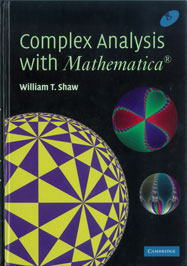|
|

Description
This book presents complex numbers in a state-of-the-art computational environment. Its innovative approach also offers insights into areas too often neglected in a student treatment, including complex chaos, mathematical art, physics in three or more dimensions, and advanced fluid dynamics. Integration with Mathematica allows topics not usually presentable on a blackboard, such as iterative equation-solving, as well as full graphical exploration of all areas covered. The included CD contains a live version of the book with all of the Mathematica code, allowing users to run computer experiments. Teachers can utilize the book for a traditional course, with Mathematica as a tool for illustration or for checking. Readers will enjoy it for self-study and enrichment. Downloads, tips, reviews, and other information are available at the book's web page. Additional Mathematica 6 notebooks to accompany this book are available in the Wolfram Library Archive. Contents Why You Need Complex Numbers | Complex Algebra and Geometry | Cubics, Quartics and Visualization of Complex Roots | Newton-Raphson Iteration and Complex Fractals | A Complex View of the Real Logistic Map | The Mandelbrot Set | Symmetric Chaos in the Complex Plane | Complex Functions | Sequences, Series and Power Series | Complex Differentiation | Paths and Complex Integration | Cauchy's Theorem | Cauchy's Integral Formula and Its Remarkable Consequences | Laurent Series, Zeroes, Singularities and Residues | Residue Calculus: Integration, Summation and the Argument Principle | Conformal Mapping I: Simple Mappings and Möbius Transforms | Fourier Transforms | Laplace Transforms | Elementary Applications to Two-Dimensional Physics | Numerical Transform Techniques | Conformal Mapping II: The Schwarz-Christoffel Mapping | Tiling the Euclidean and Hyperbolic Planes | Physics in Three and Four Dimensions I | Physics in Three and Four Dimensions II | Bibliography Related Topics Calculus and Analysis |
|
|
